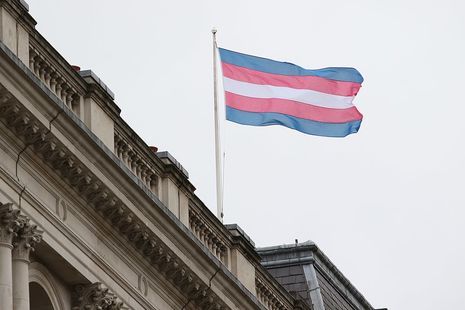A ban that excludes trans people is no ban at all
As the Conservative government pursues a ban on conversion therapy, Jake Mustard discusses the consequences for trans people who have been excluded from protections offered by the bill

Ever since Conservative ministers first began insisting that they intended to ban LGBT+ conversion therapy, they have had a hard time making anyone truly believe them. After four years of their signature “dither and delay”, it was on Trans Day of Visibility that this government revealed not one U-turn, but two! Plans to ban conversion therapy were, at first, scrapped altogether. Only a few hours later, they revised their stance: new plans would still ban attempts to alter someone’s sexuality, but not their gender identity. Trans people were to be excluded from the promises first made to them in 2018.
This latest disappointment feels as outrageous as it is does depressingly predictable. Studies have shown that 20% of trans people have been pressured to access services to change their gender identity. After endless periods of consultations, the government should be well aware of the extent of the mental health crisis within the trans community. There is a wide consensus that conversion therapy is corruptive to the mental health of its recipients, which the government also claims to recognise, and to neglect trans people from protection against this practice is shameful and illogical.
“Trans people were to be excluded from the promises first made to them in 2018”
With that said, a move like this should not have come as a surprise. At every turn, the government has dragged their heels in the pursuit of a ban, choosing to make promises and order consultations instead of committing to legislative action. Years of hesitating and consulting have successfully teased out opposition from various groups, almost as though the government were looking for a reason to backtrack on their own proposals. Having found this opposition in gender critical feminists and religious groups, the government were ready, as the Peter Tatchell Foundation put it, “to throw trans people under the bus”.
If the government’s passion on the issue of conversion therapy came from an appreciation of the long-term mental suffering of its victims, they would never have considered separating the practice between the gay and trans communities. The fundamental harm and motivation in gay and trans conversion therapy is the same — if the government sees one as worth legislating against, how can the other not be equally necessary?
The only conclusion is that Johnson only cares about LGBT+ issues when they fit with his electoral arithmetic. Which groups within the LGBT+ community are big enough to be worth appeasing and which are small enough to be electorally insignificant? By the government’s math, there are enough potential ‘LGB’ voters to make their issues pertinent. The ‘T’, on the other hand, are outweighed by the radical feminists and religious groups whose votes this government covet. The government’s decision is rooted in politics, not in principle.
“The only conclusion is that Johnson only cares about LGBT+ issues when they fit with his electoral arithmetic”
This latest U-turn should put an end to the Conservative Party’s ill-fitting masquerade as the party of LGBT+ rights. The Conservative leadership are the first to tout their title as the supposed “party of gay marriage”. They neglect to mention their status as the party of Section 28; the party of opposition to the Gender Recognition Act’s reform; and the party of a leader who refers to gay people as “tank-topped bumboys”. Now, the party of the continued legalisation of conversion therapy can be added to that list. When the Conservative party has the genuine opportunity to meet their claims of being “global leaders” on LGBT+ issues, they flounder.
The government’s retreat is surely influenced by backlash from religious groups, including the signatories of Cambridge’s Christian leaders in an open letter on conversion therapy. Gender critics have suggested that a ban would restrict therapists in discussing a patient’s gender identity. Of course, a legal ban on conversion therapy would have to be well and precisely worded, as all laws should be. There are a broad scope of legitimate discussions to be had with a patient about gender dysphoria which are clearly distinct from trying to ‘convert’ their gender. Difficulties in wording this distinction are not sufficient to support a practice which — by the accounts of this government, the NHS and conversion therapy’s victims — is damaging and abhorrent.
With this government unwilling to stand up for trans rights, the door is open for opposition parties to make a clear and undaunted stand with the whole of the LGBT+ community. The Labour Party have so far struggled to assert a clear stance on trans issues, but these latest developments strengthen the moral imperative to make up for the Conservative Party’s failings. The Conservative Party filled their consultation report with the claim “Our proposals are universal and protect everyone”. Trans lives rely on this promise being made a reality.
 News / Eight Cambridge researchers awarded €17m in ERC research grants27 December 2025
News / Eight Cambridge researchers awarded €17m in ERC research grants27 December 2025 News / Downing investigates ‘mysterious’ underground burial vault 29 December 2025
News / Downing investigates ‘mysterious’ underground burial vault 29 December 2025 Lifestyle / Ask Auntie Alice29 December 2025
Lifestyle / Ask Auntie Alice29 December 2025 Sport / Hard work, heartbreak and hope: international gymnast Maddie Marshall’s journey 29 December 2025
Sport / Hard work, heartbreak and hope: international gymnast Maddie Marshall’s journey 29 December 2025 Interviews / Meet Juan Michel, Cambridge’s multilingual musician29 December 2025
Interviews / Meet Juan Michel, Cambridge’s multilingual musician29 December 2025









